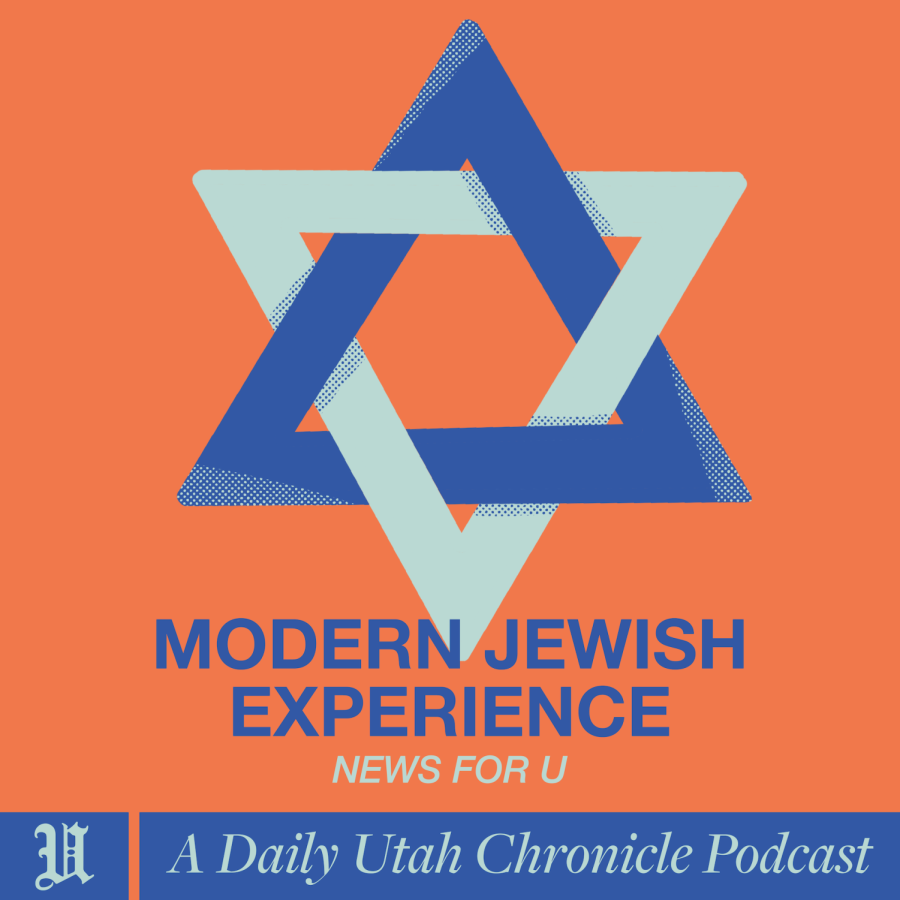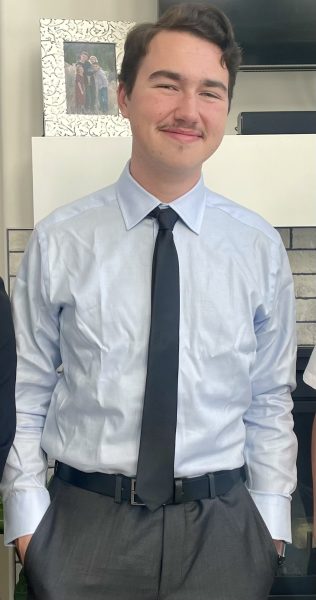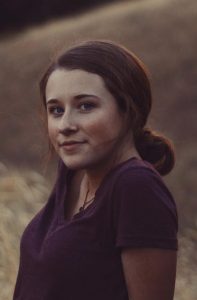News For U — Episode 10: The Jewish Experience
(Design by Syndey Stam | The Daily Utah Chronicle)
May 1, 2023
Click here to read Jake’s story.
Emma Ratkovic 0:04
Hello and welcome back to News For U, the Daily Utah Chronicle news podcast. I’m Emma and on today’s episode of the podcast, we are going to talk about the U’s April 20 discussion reflecting on Germany’s war against the Jews from an American perspective. News writer Jake Duffy has joined us today to discuss what occurred at the conversation. Hi Jake, thanks for joining us on the podcast again.
Jake Duffy 0:27
Hi. Thanks for having me.
Emma Ratkovic 0:29
Jake, can you explain one more time what you do here at the Chronicle?
Jake Duffy 0:32
So I’m a news writer at the Chronicle and lately, I’ve just been focusing mostly on events and stories about the student experience on and off campus.
Emma Ratkovic 0:41
Your recent online article examined the U’s discussion about Germany’s war against the Jews, which was moderated by Hollis Robbins, dean of the College of Humanities. Can you explain what the event focused on?
Jake Duffy 0:53
The event focused primarily on remembering the Holocaust from an American perspective and by that, it’s kind of discussing antisemitism more broadly, kind of maintaining and remembering the, kind of, dying out Holocaust survivors across the U.S. and more about kind of the hatred from both the political right and left. So talking about the Holocaust, what led to the Holocaust, the symptoms that allowed for it to continue for so long and how we can prevent that from happening in the future.
Emma Ratkovic 1:25
According to your article, antisemitic incidents rose by 36% in 2022, reaching their highest level since the Anti-Defamation League started compiling data in 1979. What actions is the university taking to ensure Jewish students, among others feel secure and at home?
Jake Duffy 1:44
The University of Utah, that I’m aware of at least, doesn’t have a Jewish student organization. Rather, there is an offshoot or a branch organization that works with the University of Utah. It’s called Hillel for Utah. So it’s a student organization that is separate from the University of Utah and not like a direct student organization with the university. But I think that Hillel does a lot for kind of young person or student representation within the Jewish community.
The U however, I feel like can and should do more to combat organizations that actively propel antisemitic conspiracies and hate speech. It’s also really important inside of a state that is as deeply red as ours and with the kind of current flux of people being in opposition to equity, diversity and inclusion institutions, to ensure that those things still exist. Another thing that I feel like is really important, especially as a political science major here at the University of Utah, is to continue to include critical race theory courses, to reference the you know, from my college experience, the racial and ethnic politics course that I took with Professor Edmund Fong. That course was an upper-division political science course as many people know, it’s a pre-law course as well, refocused mostly on how race and ethnicity has kind of played a driving force in the development of the United States and historical incidents of racism, and in this case, even antisemitism. So I feel like the U should keep working with Hillel for Utah. While continuing to ensure the existence of EDI institutions, propel those institutions forward, propel students of color and other minorities forward.
Emma Ratkovic 3:27
Can you describe the panelists’ names and the nature of their work?
Jake Duffy 3:31
Amos Guiora is a professor of law at the University of Utah’s S.J. Quinney School of Law. His parents are both Hungarian Holocaust survivors. He wrote a book called “[The] Crime of Complicity: the Bystander in the Holocaust,” and a lot of his research, or at least a lot of what he’s done on his own set of novels, sorry, not novels, just books that he’s written, have often reflected around the ideas of institutional complicity and the bystander effect and how those two things kind of allowed for the Holocaust to continue for such a long period of time. So he was there to bring those ideas of institutional complicity in the bystander effect while also being a direct reference of somebody that has a lineage or connection to the Holocaust having both of his parents been survivors of the event.
Bob Goldberg is a former professor of history at the University of Utah. He also wrote a research paper called “The Bystander During the Holocaust,” not to be confused with “The Bystander in the Holocaust,” Amos Guiora’s book. And Bob Goldberg, also raised Jewish as well was able to, you know, contribute some of his insights as a professor and how people were complicit during the Holocaust.
Emma Ratkovic 4:47
In your story, you revealed new statistics by the Associated Press. Can you explain what the statistics revealed?
Jake Duffy 4:55
The Associated Press found that nearly 90% of U.S. Jews feel that antisemitism is a serious problem in this country. That is a dramatic rise from the 73% that was in 2016. There’s a lot of contributors that have led to this rise in antisemitic incidents in the U.S. However, I believe that the drastic increase, and especially what we had discussed at the event, as well is as a result of the Soros or George Soros-oriented conspiracies that are affiliated with Donald Trump and the political far-right. Also paired with between those four years of 2016 and 2020, increased Palestinian solidarity, increased conflict within the region, as well. So there’s been a little bit of a growing sentiment of antisemitism on the left and right, and people on the left who often affiliate Jewish people with kind of the State of Israel, and then people on the right have co-opted the Israeli flag as kind of a symbol of Western hegemony. And so it’s got two different components that are kind of leading up to it and this kind of antisemitism is coming from both sides of the political spectrum.
Emma Ratkovic 6:05
Can you explain what anti-Zionism is as defined by the Anti-Defamation League?
Jake Duffy 6:12
Anti-Zionism, I’ll go ahead and pull a quote directly from their website, but “anti-Zionism is antisemitic, in intent or effect, as it invokes anti-Jewish tropes, is used to disenfranchise, demonize, disparage, or punish all Jews and/or those who feel a connection to Israel, [equates] Zionism with Nazism and other genocidal regimes.”
Emma Ratkovic 6:35
What was Goldberg’s opinion on the presidency of Franklin D. Roosevelt in relation to the prosecution of Jewish people during World War II?
Jake Duffy 6:43
Professor Goldberg’s “[The] Bystander during the Holocaust” is a research paper that I had also read, and it cites several incidents in which countries around the world were, essentially bystanders in the genocide against Jewish people during World War II. So, the Franklin Delano Roosevelt, or the FDR administration, rather had, for all intents and purposes, not met, or even reached closely the amount of people that it could have received from Eastern Europe that were commonly seeking asylum in Western countries and the United States. And so I don’t have the exact numbers on that but there was a few hundred thousand Jewish people that were seeking asylum from Eastern Europe in the United States, and FDR actively denied or prevented that from happening. So there might be political reasons in the 1940s and late 30s that led to this. But for the most part, I believe that it was a prime example of how many lives could have been saved by the FDR administration and also more of a macro criticism of how the US was a little bit late to the second World War, and a little bit late towards combating the genocide and persecution of Jews in the 1930s and 1940s.
Emma Ratkovic 7:58
You explained that as the discussion went on, the philanthropist George Soros was mentioned in relation to antisemitic plots by Goldberg. What has Soros been accused of?
Jake Duffy 8:09
Bob Goldberg during the event had mentioned how the George Soros conspiracies are often incited and kind of projected by far-right pundits and even former President Donald Trump. They often blame George Soros as being this kind of billionaire philanthropist that has financed Latin American caravans crossing the U.S. border, paying for protests in the wake of the murder of George Floyd and also has been accused of owning a lab in Wuhan where the COVID-19 virus allegedly had escaped. There’s a lot of conspiracies that are levied towards George Soros and so those have often fueled a kind of white supremacist bend of antisemitism and kind of create an idea that there is a giant establishment or giant cabal that is fueled by George Soros. So combating those conspiracies on the far right is really important to Goldberg and all the people that are trying to combat antisemitism in the U.S.
Emma Ratkovic 8:11
What is the Stand Up to Jewish Hate Campaign and what does the campaign encourage people to share?
Jake Duffy 9:15
The Stand Up to Jewish Hate Campaign was started by the CEO of the New England Patriots, Robert Kraft. So the campaign encourages people to share a blue square and the hashtag — or, sorry, the hashtag with a blue square, that represents the 55% of all religious hate crimes that are directed towards Jewish people in the United States.
Emma Ratkovic 9:36
What is being done to educate future generations about the Holocaust and the events that occurred?
Jake Duffy 9:41
Not much that I know of right now. I think that it’s just crucial for us to do exactly what Guiora and Goldberg had advised and recommended. The last generation of Holocaust survivors are dwindling down to extremely low amounts of people and so trying to reach out to those people — remembering them, commemorating them, platforming them is really important to having that direct connection. And I think what the next generation of Jewish people in the United States have to grapple with is losing that direct connection to the Holocaust and there will be no longer any people that have experienced it. And so the challenge really is making sure that it is a part of the curriculum, both in primary and secondary educational institutions, and ensuring that we’re combating antisemitism, which often either minimizes or just completely eliminates the possibility of the Holocaust having even happened in the first place.
Emma Ratkovic 10:40
Is there anything else you would like to add today?
Jake Duffy 10:43
Yes, I think after talking to Asher Ireland, who is the president of the student board, Hillel for Utah. We had a discussion where the subject that is incredibly politically tenuous, which is the intersection between anti-Zionism and antisemitism, is very present on the political left. And so I believe that we should acknowledge it on both sides. It’s more obvious the white supremacist bend on the political right, but also acknowledging the fact that, with my conversation with Ireland, who was telling me that denying Israeli or Jewish right for self-determination is inherently antisemitic. And on top of that, as well, it’s totally fair to criticize and be critical of the Israeli Defense Force, and some in Israel, but making sure that we’re not assimilating all Jewish people as being a part of Zionism, or the Israeli Defense Force and ensuring, you know, in the same way, that we don’t assimilate all Muslims, or all Arab people as being a part of Hamas or Hezbollah in the Middle East. So I think that the famed journalist who covered the Nuremberg trials, Hannah Arendt, created this concept of the banality of evil when studying and writing about the Adolf Eichmann trial. And I believe that the Holocaust was perpetrated by people that were able to commit really gruesome acts of violence based off of how it was normalized throughout society. So it’s important that we don’t make the same mistake and we remember these experiences, these people that experienced one of the worst genocides in human history, and to not make antisemitism or violence against marginalized people, as just a normalized aspect of our society.
Emma Ratkovic 12:30
Thank you so much for joining us on the podcast today, Jake.
Jake Duffy 12:33
Awesome. Thank you.
Emma Ratkovic 12:34
And thank you for joining us on today’s episode of News For U and we will catch you in the fall.
Executive Producer: Theadora Soter — [email protected] | @sotertheadora
Producer: Graham Jones — [email protected] | @grahamcool8
Host: Emma Ratkovic — [email protected] | @eratkovic_news
Guest: Jake Duffy — [email protected] | @JakeDuffyChrony










